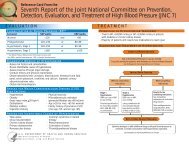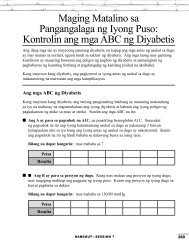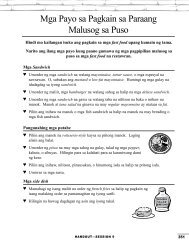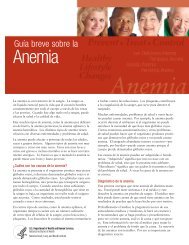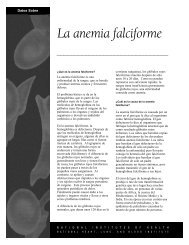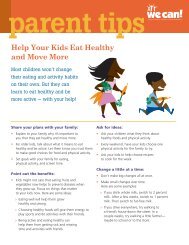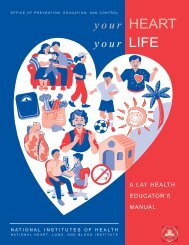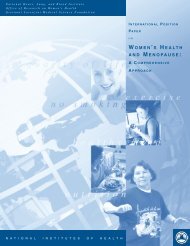HeartsNParks Community Mobilization Guide - National Heart, Lung ...
HeartsNParks Community Mobilization Guide - National Heart, Lung ...
HeartsNParks Community Mobilization Guide - National Heart, Lung ...
Create successful ePaper yourself
Turn your PDF publications into a flip-book with our unique Google optimized e-Paper software.
7 False. Most vegetable oils—canola,<br />
corn, olive, safflower, soybean, and sunflower<br />
oils—contain mostly monounsaturated<br />
and polyunsaturated fats, which<br />
help lower blood cholesterol when used<br />
in place of saturated fats. However, a few<br />
vegetable oils—coconut, palm and palm<br />
kernel oils—contain more saturated fat<br />
than unsaturated fat. A special kind of<br />
fat, called trans fat, is formed when<br />
vegetable oil is hardened to become<br />
margarine or shortening, through a<br />
process called “hydrogenation.” The<br />
harder the margarine or shortening, the<br />
more likely it is to contain more trans<br />
fat. Choose margarine containing liquid<br />
vegetable oil as the first ingredient. Just<br />
be sure to limit the total amount of any<br />
fats or oils, since even those that are<br />
unsaturated are rich sources of calories.<br />
8 True. People who have had one heart<br />
attack are at much higher risk for a second<br />
attack. Reducing blood cholesterol levels<br />
can greatly slow down (and, in some<br />
people, even reverse) the buildup of<br />
cholesterol and fat in the wall of the<br />
coronary arteries and significantly reduce<br />
the chances of a second heart attack. If<br />
you have had a heart attack or have coronary<br />
disease, your LDL level should be<br />
around 100 mg/dL, which is even lower<br />
than the recommended level of less than<br />
130 mg/dL for the general population.<br />
9 False. Children from “high risk”<br />
families, in which a parent has high<br />
blood cholesterol (240 mg/dL or above)<br />
or in which a parent or grandparent has<br />
had heart disease at an early age (at 55<br />
years or younger), should have their<br />
cholesterol levels tested. If a child from<br />
such a family has a high cholesterol<br />
level, it should be lowered under<br />
medical supervision, primarily with diet,<br />
to reduce the risk of developing heart<br />
disease as an adult. For most children,<br />
who are not from high-risk families, the<br />
best way to reduce the risk of adult heart<br />
disease is to follow a low saturated fat,<br />
low cholesterol eating pattern. All children<br />
over the age of 2 years and all adults<br />
should adopt a heart–healthy eating pattern<br />
as a principal way of reducing coronary<br />
heart disease.<br />
10 False. Blood cholesterol levels in both<br />
men and women begin to go up around<br />
age 20. Women before menopause have<br />
levels that are lower than men of the<br />
same age. After menopause, a women’s<br />
LDL-cholesterol level goes up—and her<br />
risk for heart disease increases. For both<br />
men and women, heart disease is the<br />
number one cause of death.<br />
11 True. Food labels have been changed.<br />
Claims like “low–fat” or “light” on<br />
certain foods are government–regulated.<br />
Look on the nutrition label for the<br />
amount of saturated fat, total fat, cholesterol,<br />
and total calories in a serving of<br />
the product. Use this information to<br />
compare similar products and find the<br />
ones with the smallest amounts. If there<br />
is not a nutrition label, look for the list<br />
of ingredients. Here, the ingredient in the<br />
greatest amount is shown first and the<br />
ingredient in the least amount is shown<br />
last. So, to choose foods low in saturated<br />
fat or total fat, go easy on products that<br />
list fats or oil first, or that list many fat<br />
and oil ingredients.<br />
NHLBI Health Information Center<br />
P.O. Box 30105, Bethesda, MD 20824-0105<br />
phone: (301) 592-8573 fax: (301) 592-8563<br />
High Blood Cholesterol 77



